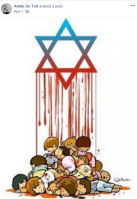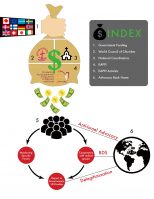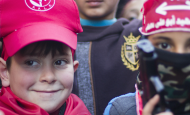EAPPI: The World Council of Churches’ Training Camp for Anti-Israel Advocacy
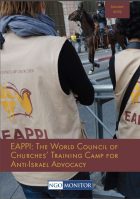
Executive Summary
- EAPPI, the World Council of Churches’ flagship project on Israel and the Arab-Israel conflict, has brought 1,800 volunteers to the West Bank to “witness life under occupation.” The World Council of Churches does not run similar activities in other conflict zones. By singling out Israel, EAPPI embodies antisemitism, as defined in the International Holocaust Remembrance Association’s working definition.
- Despite marketing itself as a human rights and protection program, EAPPI places significant emphasis on political advocacy before, during, and after the trip. When volunteers return to their home countries and churches, they engage in anti-Israel advocacy, such as BDS (boycott, divestment, and sanctions) campaigns and comparing Israel to apartheid South Africa and Nazi Germany.
- Participants are selected by country-specific non-governmental organizations (NGOs) known as “National Coordinators.” The National Coordinators are also active in BDS and other delegitimization campaigns against Israel.
- EAPPI receives funding from a variety of sources, including the WCC and National Coordinators. Funding from different governments is directed to EAPPI through the National Coordinators and via UNICEF.
- EAPPI contributes to a UN “Working Group” consisting of a number of UN agencies and NGOs that collaborate on and coordinate politicized anti-Israel campaigns in the West Bank. In this capacity, EAPPI does “a lot of administrative work which is fed into UN systems.”
- EAPPI partners with a number of political NGOs in the region, including groups that support BDS campaigns against Israel and/or that accuse Israel of “war crimes.”
- The significant problems with EAPPI, as laid out in this report, should be seen in light of the antisemitism1 and demonization that emerges from EAPPI’s parent body (World Council of Churches), partners, and affiliated staff.
Recommendations
To the donor governments – Act immediately to broadly reevaluate funding to EAPPI, in order to ensure that these funds are not misused to promote antisemitism, BDS, and lawfare, and/or to fuel the conflict. Donor governments must develop and implement transparent funding guidelines that are accountable to the public.
To the Israeli government – The Israeli government should develop a consistent, fact-based policy to deal with “delegimization” campaigns, which it defines as a strategic threat. It should engage in critical dialogue with the government donors, as well as with the churches involved with EAPPI.
To the WCC– If it desires to improve its image in Israel and with the global Jewish community, the WCC should not promote an ideology that denies Israel’s right to exist as a Jewish State and/or that discriminates against Christian supporters of Israel.
I. Overview and the Centrality of Advocacy
Founded in 2002, Ecumenical Accompaniment Programme in Palestine and Israel (EAPPI) is the Geneva-based World Council of Churches’ (WCC) “flagship project” on the Arab-Israeli conflict. 2 EAPPI’s stated mission is to “witness life under occupation, engage with local Palestinians and Israelis pursuing a just peace, to change the international community’s involvement in the conflict, urging them to act against injustice in the region.” The program brings international activists, referred to as “Ecumenical Accompaniers” (EAs), to the West Bank; the EAs apparently enter Israel with tourist visas. In the past 15 years, EAPPI has brought 1,800 EA volunteers on the program.
The WCC’s EAPPI program consists of a “continuous presence of 25-30 Ecumenical Accompaniers on the ground, for periods of three months in accompanying, offering protective presence, and witness… monitoring and reporting human rights abuses… standing with local peace and human rights groups… and advocacy.” According to WCC’s International Coordinator for EAPPI Dr. Owe Boersma, the monitoring component includes “a lot of administrative work which is fed into UN systems” (emphasis added). EAPPIs from some or all countries are provided with a living allowance (for food, short travel, etc.); round-trip airfare from their host country; communications expenses; and accident, travel, and medical insurance.3
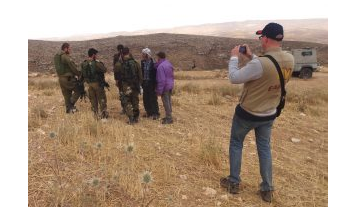
German EAPPI activist monitoring Israeli soldiers Photo from EAPPI Germany website: http://www/eappi-netzwerk.de/bewerben-sie-sich-jetzt/
Upon first arriving in Israel, EAs are “provided with a training of about 10 days in Jerusalem prior to their placement.” These Jerusalem-based sessions include “training for advocacy upon returning to home country.” After, activists are placed in “East Jerusalem, Qalqylya/Tulkarem, Jericho, South Hebron Hills, Hebron, Bethlehem and Yannoun.” EAs are also located at checkpoints, and points of friction between Israelis and Palestinians and between Palestinians and the IDF – including in the Old City of Jerusalem.
At the end of their volunteer service, EA’s participate in a “two day debriefing including group discussion, evaluation of the programme, storytelling and preparation for cultural re-entry as well as tips for public speaking & advocacy.”
EAPPI’s “extensive advocacy” includes sharing “first-hand experiences to open the eyes of their communities, churches and governments to the realities of occupation.” According to EAPPI, advocacy includes both work in Israel “and back in our home countries…Advocacy is the tool for increasing international action for change. We share eyewitness testimonies with faith leaders, decision makers, media, civil society, and business officials, so that they change public policy…Increased international awareness increases pressure on the perpetrators of human rights abuses and helps protect civilians from these abuses” (emphasis added). Accordingly, many EAs participate and lead BDS (boycott, divestment, and sanctions) campaigns against Israel upon their return to their home countries.
II. Organizational Structure
WCC
EAPPI is a project of WCC and therefore reflects its ideology and theology. This includes support for “an international boycott of goods and services from illegal Israeli settlements in the OPT,” encouraging “member churches to avoid investments or other economic links to illegal activities on occupied territory,” promoting the 2009 Kairos Palestine document,4 and combating Christian Zionism.5
Furthermore, top WCC officials have denied the ties of modern Israel to Jewish history in the land of Israel and have compared Israel to apartheid South Africa and Nazi Germany. On June 20, 2017, at the “Bethlehem Consultation on 50 Years of Occupation,” the WCC’s general secretary Dr. Olav Fykse Tveit stated, “I heard about the occupation of my country during the five years of World War II as the story of my parents. Now I see and hear the stories of 50 years of occupation…” (emphasis added). This type of language falls within the definition of antisemitism issued by the International Holocaust Remembrance Alliance and adopted by the European Parliament on June 1, 2017.
At an August 2015 “Israel: Palestinian Christian Perspective” conference, promoted by the BDS Movement, WCC’s co-moderator of PIEF (see below) Robert Smith stated, “Christian theology that support Zionism is heresy… Such Christian theology that support Zionism is a false teaching that must be confronted…it is essential for all of us to understand that the Israel of the bible the ancient Israelites are not link in any substantive or material way to the contemporary modern state of Israel…the Israeli society is full with racism and light skin privilege…” (emphasis added).
In addition, on Sep 15, 2016, Tveit and Jim Winkler (National Council of the Churches of Christ in the USA), issued a statement arguing that “we see parallels between the crisis in Israel and Palestine and the struggles for racial justice in the United States and the anti-apartheid struggle in South Africa…One cannot keep an entire people subject to pressure and violence for many years and not expect a violent reaction. We do not endorse violence, but we know people are losing hope and faith in the efficacy of nonviolent means” (emphasis added).
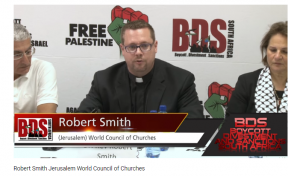
WCC’s Co-moderator of PIEF Robert Smith speaks at a BDS conference in South Africa.
Screenshot from BDS South Africa Youtube video, September 27, 2015: https://www.youtube.com/watch?v=etTBIHHYq6M
Coordination of the WCC-EAPPI program is carried out by a team in Geneva under the WCC’s “Peacebuilding section of the Public Witness and Diakonia programmatic area,” headed by Rev. Dr. Owe Boersma.6 Recruiting, training, and advocacy coordination are done by 22 country specific church-based frameworks, known as “National Coordinators.” For instance, in the UK and Ireland, EAPPI is administered by the Quakers in Britain on behalf of 16 partner organizations, which include church groups and NGOs such as CAFOD, Christian Aid, Pax Christi UK, and Trocaire; in Denmark, EAPPI is administered by DanChurchAid; in Norway by Norwegian Church Aid; in Switzerland by HEKS EPER and Peace Watch Switzerland; and in Netherlands by Kerk in Actie.
Some National Coordinators’ grantees and partners are involved in political campaigns against Israel (see below).
EAPPI does not have “formal legal registration within the country of operations [Israel],” but rather a “locally registered nongovernmental organization acts as custodian” for the program. Specifically, EAPPI operates out of the Jerusalem Inter Church Centre’s (JIC) office. According to EAPPI’s website, JIC, headed by Yusef Daher (see below), also provides “guidance and coordination with the local churches.”
A number of local Israeli and Palestinian NGOs constitute EAPPI’s “Local Reference Group (LRG),” which “provides guidance, advice and support to the WCC-EAPPI staff and National Coordinators…strengthening relations with the local churches and local partner organizations, as well as promoting the WCC’s EAPPI at local and national levels…The LRG meets regularly, supervising the programme and ensuring its alignment at all times with the WCC’s objectives.”
Dr. Zoughbi Zoughbi, founder and director of the political NGO W’iam, serves as EAPPI’s Secretary and interim Local Programme Coordinator.
National Coordinators
EAs are recruited and sent from countries where the program has an “established a national coordination office.”7 (see here for sample application form). These National Coordinators are responsible for a number of activities, including recruiting “volunteers” (EAs), covering some or all of the costs of the program (depending on the country), and conducting pre-trip orientations. For example, prior to Norwegian participants’ trip, EAs learned about the “Israeli-Palestinian conflict history and current situation, the religious dimension, international humanitarian law, program, locations, security, team issues, contact with media…” In Denmark, according to Dan Church Aid’s 2015 report, EAs were provided with “learning material, including training videos on volunteering and reporting mechanisms for human rights violations.”
National Coordinators are also responsible for follow-up and post-trip “advocacy and awareness building work.” EAPPI explains that this is an “essential part of the program” and that the National Coordinators “have different expectations for the number of articles being produced during the stay as well as public speaking engagements upon return. Volunteers with specific skills like video filming or photographing might want to produce exhibitions or documentaries in cooperation with their national coordination.”
In Norway, for example, Norwegian Church Aid (NCA) “coordinates the Norwegian contribution and is responsible for recruitment, training, deployment and follow-up of 16 Ecumenical Accompaniers (EAs) annually.” Former EAPPI advocacy officer Nader Hanna explained that “NCA is also involved in recruitment, which is the most important. So they (NCA), they’re advertised – they do interviews, they receive applications, they do tests, and they also test them before they come here. And when they go back home, NCA is also coordinating their advocacy efforts back home…NCA is funding, and facilitates so that candidates are able to come and participate in this program.”
Funding
In 2017, WCC allocated $1.3 million to EAPPI. Of this, $803,000 was spent on Ecumenical Accompaniers from Austria, Australia, Germany, Switzerland, Denmark, the UK, Ireland, Norway, Sweden, Finland, and the US, and in partnership with UN bodies.
According to NGO Monitor research, most funding to EAPPI is allocated from local church based NGOs to WCC, for use by EAPPI. Examples of this type of funding include:
- The Swiss church NGO HEKS provided CHF 300,000 in 2018 and CHF 225,000 to EAPPI in 2016. In 2015, 24% of HEK’s funding came from government sources in Switzerland. According to UNOCHA, it appears that in 2018 HEKS provided $56,615 to ACT Alliance / Dan Church Aid – Norwegian Church Aid Joint office in Palestine for an EAPPI project.
- In 2017, the British church NGO CAFOD granted £25,000 in 2018 and £30,000 in 2017 to Quaker Peace and Social Witness for use by EAPPI (see below). In 2015-2016, CAFOD received funding from the EU, UK, and Ireland.
- In 2017-2019, EAPPI will receive $328,995 from DanChurchAid (Denmark) and in 2014-2016, it received $281,451. DanChurchAid receives funding from Denmark and the EU.
- In 2018, ACT Alliance / Diakonie Austria provided $10,112, ACT Alliance / Finn Church Aid provided $97,638, ACT Alliance / Norwegian Church Aid provided $64, 038, and ACT Alliance / United Church of Canada provided $7,464 to ACT Alliance / Dan Church Aid – Norwegian Church Aid Joint office in Palestine for an EAPPI project.
Research also shows funding for EAPPI that is external to WCC, with a significant portion originating with or being channeled to National Coordinators. The extent to which this funding is reflected in WCC’s financial documents is unknown.
NGO Monitor research also notes the following government funding to EAPPI:
Norway
- EAPPI is considered to be the “main project” of Norwegian Church Aid’s (NCA) “Faith Communities and Peace Building program in Israel-Palestine.”8 This NCA program is funded by the Norwegian Ministry of Foreign Affairs and its Section for Humanitarian Affairs.
- In 2017-2018, the Norwegian Ministry of Foreign Affairs provided NOK 4,052,534 to NCA for EAPPI.
- From 2011-2015, Norway provided NOK 13.7 million to EAPPI and its partner Rabbis for Human Rights.
- Support to WCC “plus funding for EAPPI” in 2015 was NOK 2.6 million.
- In addition, according to UN-OCHA’s reporting system, in 2015 the Norwegian government granted $287,323 via Save the Children to several organizations and implementing partners, including EAPPI, as well as YMCA, Ma’an Development Center, and the Palestinian Center for Democracy and Conflict Resolution (PCDCR).
Sweden
- The Swedish Mission Council Humanitarian Framework, which is a recipient of Swedish government funding, states that EAPPI will receive SEK 6 million per year in2017-2019 (totaling SEK 18 million).
- In 2013-2015, the Swedish government (Swedish International Development Cooperation Agency) transferred $2.5 million to the Swedish Council of Churches for EAPPI ($711,803 in 2015; $874,648 in 2014; $921,206 in 2013).
Germany
- “Bread for the World supports this EAPPI program with ecclesiastical funds, with a contribution to the shared costs of the Geneva office and the cost of preparing and posting 10-15 volunteers from Germany.” Bread for the World receives extensive funding from the German government.
Finland
- In 2015, Finn Church Aid noted that the Finish MFA was the primary funding source for EAPPI’s Global Coordination Project, providing €122,000 for its “Common Responsibility Campaign.” According to Finn Church Aid’s 2015 Annual report, FCA sent 10 EAs on the program with the support of the Finnish MFA. Three EAs were supported by UNICEF for EAPPI’s work on “access to education.”
- In 2013, Finland granted $222,673 to the “Swedish Ecumenical Accompaniment Programme in Palestine and Israel (via FEAPPI/Finn Church Aid).
UNICEF
- Since 2013, UNICEF has channeled extensive donor-government funds to EAPPI for a project “Protected and safe access to schools as an emergency response for vulnerable communities in the oPt.”
- In 2016–2017, EAPPI and Christian Peacemaker Teams (CPT) received $751,853 for implementing UNICEF’s “safe schools” UNICEF project.
- According to UN-OCHA, in 2015, Canada provided UNICEF with $790,514 for a project implemented by EAPPI and Christian Peacemaker Teams (CPT, see below).
- In 2015, Japan and UNICEF National Committee/France granted $486,799 via UNICEF to several organizations as implementing partners, including EAPPI, as well as Palestinian Center for Human Rights (PCHR), B’Tselem, War Child Holland, Defense for Children International – Palestine (DCI-P), Norwegian Refugee Council (NRC), OCHA, OHCHR, UNRWA, and others for a project “Informing humanitarian programmatic and advocacy response through documentation of grave violations against children affected by armed conflict.”
- In 2013, Japan provided $538,004 to UNICEF. EAPPI served as the implementing partner “to provide protected and safe access to education for prioritized highly vulnerable communities in the West Bank, including East Jerusalem, in which protection issues affect access to education.”
Additionally, in 2018, EAPPI received two grants via the “occupied Palestinian territory Humanitarian Fund” (oPt-HF), an “emergency pooled fund that supports the delivery of strategic humanitarian assistance to address priority needs, while retaining the flexibility to respond unforeseen emergencies or events”: EAPPI, together with Christian Peacemaker Teams (CPT), served as implementing partners for a UNICEF project, receiving $244,558 to “To provide protective presence and accompaniment to ensure safe access to education for vulnerable school children in the West Bank, including East Jerusalem.” oPt-HF also provided $249,999 to ACT Alliance / Dan Church Aid – Norwegian Church Aid Joint office in Palestine for a WCC-EAPPI project, focused on providing “protective presence” in East Jerusalem “seeking to prevent child arrests.”
III. Political Activity and Advocacy
NGO Monitor research has identified numerous activities and statements by EAs and other EAPPI affiliates that demonstrate their support and involvement in activities that delegitimize Israel.
EAPPI and its activists are known for inflammatory anti-Israel, and at times antisemetic, rhetoric and advocacy. In July 2012, Vivian Wineman, at the time the President of the UK Jewish Board of Deputies, referred to EAPPI as “inflammatory and partisan…its graduates return with simplistic and radical perspectives. Members of Jewish communities across the country have suffered harassment and abuse at EAPPI meetings.”
According to the UK Jewish Board of Deputies, EAPPI “helped to create a climate of hostility towards Israel within the Church of England.” Furthermore, “The EAPPI narrative is based on the experience of volunteers who spend several months living alongside Palestinians in the Territories, but less than a day in Israel, and then return to address audiences who know little or nothing about the reality of everyday life for those on both sides of the conflict.”
For example, EAPPI’s core publication, “
Ecumenical Accompaniers
Ecumenical Accompaniers (EAs) have made numerous inflammatory and factually inaccurate statements, both during and following their participation in EAPPI. Blogs, presentations, public statements, and social media make these proclamations available to the public.
- During a September 2017 presentation on EAPPI given by an EA, Gordon Timbers of the Presbyterian Church of Canada, an audience member asked, “Excuse me; I have to make a comment at this point. I don’t know how many people here have seen the model of the gas chambers … and some of these things really remind me [unintelligible] and I often wondered if any Jewish people who go in to see that model ever think of what is set up here” (emphasis added). In his answer, Timbers did not dispute the false claim, answering instead “…Thank you for that, because there are similarities. All these identity papers and restriction of movement and checkpoints and all of these things, yes, that does make people think.”
- Another EA from Canada and a “long standing member of Amnesty International “ stated in a presentation that “There are signs all over the West Bank whenever a road leads to area A which is where the PA has a full control it says that it’s illegal for Israelis to go on that road to go into that area. They are forbidden by law and it’s allegedly dangerous to their lives. Of course, I never felt the dangers at all. I suspected that the real reason for the signs was to prevent the Israelis from seeing what was going on… “ (Video on file with NGO Monitor.)
- On April 17, 2018, “A team minister” at St. Paul’s United Church in Riverview, NB, Canada who was volunteering with EAPPI in Bethlehem, wrote that “The ‘March of Return’ focuses on their rights, guaranteed under the Geneva Convention, to return to the land their ancestors have inhabited since before recorded history…The roots of the ‘March of Return’ go back to 1948, when faced with terrorist attacks by Israeli forces, 750,000 Palestinians fled some 600 villages and towns.”
- An EA cited in EAPPI’s 2013 report “Education Under Occupation” shared this virulently antisemitic image on her Facebook page:
- An EAPPI-Switzerland blog featured an interview with Manal Tamimi (June 10, 2017). Manal Tamimi frequently utilizes antisemitic and violent rhetoric and imagery on social media. For example, on August 1, 2015, Tamimi tweeted, “I do hate Israel ,i (sic) wish a thrid Intefada (sic) coming soon and people rais (sic) up and kills all these zionist settlers everywhere.” In September 2015, on Yom Kippur (a fast day and the holiest day of the year in the Jewish calendar), Tamimi tweeted:“Vampire zionist celebrating their Kebore day by drinking Palestinian bloods, yes our blood is pure & delicious but it will kill u at the end” The UN removed Tamimi from a report listing her as a “human rights defender”, after NGO Monitor filed a complaint documenting her antisemitic and violent tweets.
- In 2016 in South Africa, EAPPI activists participated in Apartheid Week events in Pretoria and in 2017 at Nelson Mandela University. BDS South Africa’s website also stated that a leading EAPPI activist participated in its Apartheid Week events. A South African EA who participated in the program twice advocated for crippling the Israeli banking system, calling for “SWIFT [Society for Worldwide Interbank Telecommunication] sanctions against Israel.” He stated that, “If we can develop the momentum of sanctions against Israeli banks then all the power of the Israeli military becomes irrelevant…that’s really the basis to support the BDS program…without access to SWIFT….the whole economy would quickly collapse…the time has come to say that the victims of the Holocaust have now become the perpetrators” (emphasis added).
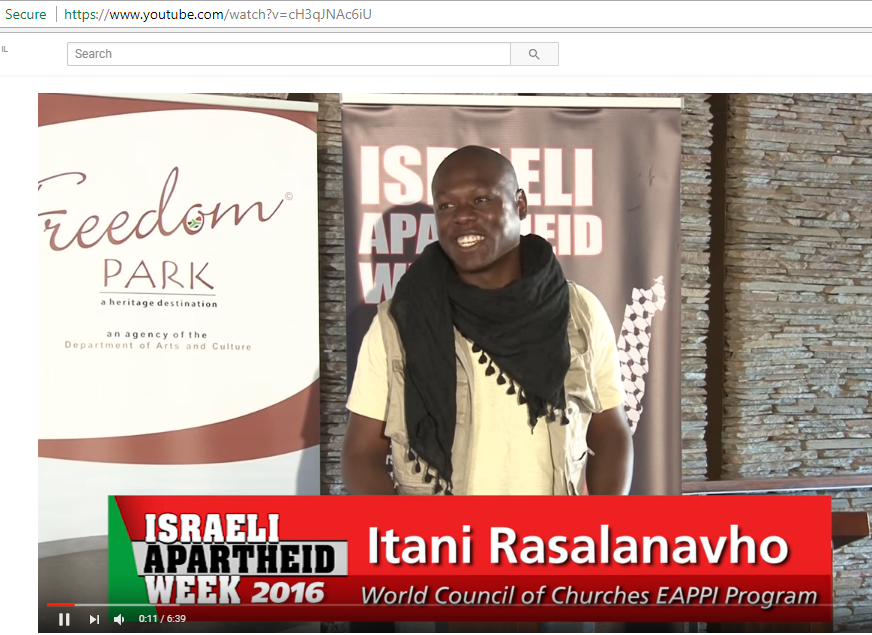
EAPPI activist Itani Rasalanavho speaks at Israeli Apartheid Week in South Africa. Screenshot from BDS South Africa Youtube Video, April 14, 2016: https://www.youtube.com/watch?v=cH3qJNAc6iU
- On February 6, 2014, four EAs participated in discussions of South African Parliament’s Portfolio Committee on International Relations and Cooperation, which “held a public forum to support the campaigns for equal treatment and the right to self-determination of the peoples of Palestine, Western Sahara and Cuba.” They noted, “We want complete military, diplomatic and financial sanctions against Israel until it complies with all applicable UN resolutions and international law, and ends the occupation.”
- In London, in May 2016, an EAPPI activist discussed the experience she had in Hebron. During her presentation, she blamed the “Jewish lobby” and its influence in the US as an explanation for “why Evangelical Christians are not as sympathetic to the Palestinian plight.” She also supported a Palestinian “right of return,” called for a complete boycott of products and services from Israel, and referred to Israeli killing of Palestinian terrorists in Hebron “that supposedly had knives, but there are videos that show they have been planted.”
- An Austrian EA, Irene Benitez, is quoted in an article on the Austrian sending organization Diakonie’s website. In the article about EAPPI’s program, Irene accuses the IDF and Israeli civilians of “regularly” carrying out “attacks” against “the Palestinian population.” (NGO Monitor translation from original German). Diakonie concluded that “Benitez, like her colleagues before, will contribute to the enlightenment in Austria regarding the tense situation in Palestine. She is planning lectures in parishes, schools and congregations and is available for interviews, which we are happy to provide.” (NGO Monitor translation from original German).
- On June 18, 2017, an EA from England (who participated in EAPPI from April to July 2016) gave a presentation “EYE-WITNESS – Stories from the West Bank & Israel” at a church in Liverpool. The EA discussed the “Bedouin community called Jabel ababa” and claimed that the “Israeli government is trying to force a relocation plan on all Bedouin communities and to make them move into townships… does that ring a bell somewhere back to South Africa? Strongly reminds me of what the British did to the Aboriginals some 200 years ago, and what about what happened to the native Indians in the USA at around the same time…” According to statistics only 2% of Palestinians support violence as part of the solution to the conflict …” He added that “the Israeli government is set on not allowing any greater proportion of Palestinians that already exist, Arab-Israelis or Palestinians, so they can’t be more then, currently there are about 39 percent of the total population but Israel wants that figure to be 30 so that is one of the reasons for house demolitions… and often when Arab Israeli are punished, how are they punished? They can either be sent to the West Bank to get them out of Israel or worse sometimes they are sent to Gaza…“ (06:40, 09:00, 01:05:30).
- An EA from the US stated in a presentation that he participated in a “journey along the Palestinian via Delarosa called the Contemporary Way of the Cross…at each station of the cross we reflected on the continuing suffering of the Palestinian people and linked it with the original events of Good Friday during another occupation two thousand years ago…” (38:13-38:46, emphasis added). The EA also promoted BDS campaigns against Israel, proclaiming that “Soda Stream is very popular in the United States… if you would like to support the Soda Stream boycott, I have some cards…and this afternoon I’m going to be joining Jewish Voice for Peace for their monthly boycott… (36:00-37:00, emphasis added).
- EAs in Finland have been active in lobbying on the issue of the EU’s labelling of settlement products, “appealing also to MEPs, e.g. during the annual EAPPI lobby trips to Brussels, arranged by WCC.”
- On March 3, 2018, a group of EAs met with the head of the Palestinian NGO Ma’anDevelopment Center, Saami Khader, and Ma’an activist Hamza Zbeidat, as well as an individual from the Norwegian Representatives Office in Ramallah. As identified in the Daily Telegraph, Zbeidat is a member of the PFLP terror group. Another Ma’an employee, Ahmad Abdallah Aladini, was referred to by the PFLP as a “comrade” after being killed in the violence along the Gaza border in May 2018.
- In January 2017, three EAs appeared before the Oireachtas Committee on European Union Affairs regarding the alleged “dramatic increase in the destruction and confiscation of Palestinian dwelling and livelihood structures by the Israeli army in the West Bank and East Jerusalem in 2016,” focusing on “the destruction of humanitarian aid funded by the EU” and recommended, inter alia, that committee call upon the Minister for Foreign Affairs and Trade “to raise the issue of the dramatic increase in the destruction of EU funded humanitarian aid at the next EU Foreign Affairs Council meeting and that this committee also requests to be updated on a regular basis on the efforts being made by Ireland to push for a cessation of such breeches [sic] of International law in the West Bank and East Jerusalem.”
- In November 2014, nine EAs met with EU officials in Brussels where they “urged the European Union (EU) to take more effective actions against the illegal settlements, demolitions and forced displacement in the occupied territory controlled by the Israeli authorities.”
- In April 2013, a group of EAs participated in a tour of Jerusalem with Mohammed and Ali Jiddah. Mahmoud Jiddah, reportedly a “PFLP member,” and his cousin Ali Jiddah were imprisoned by Israel for 17 years for carrying out grenade attacks against Israeli civilians in Jerusalem in 1968.
NGO Monitor has also found numerous presentations created by EAs, National Coordinators, the WCC, and other local affiliates.9 Some of these presentations appear to be geared toward recruiting of future EAPPI participants while others are more focused on providing general information. A number of presentations refer to the establishment of the State of Israel as the Nakba (“disaster”), promote a Palestinian right of return, and deny Jewish history and ties to Israel. For example, a presentation created by Rev. Joan Fisher, a priest and EAPPI activist, instructs individuals to support BDS, presents a historically inaccurate account of the conflict, and recounts a quote from a Palestinian cleric, “We are sympathetic to the suffering of our Jewish brothers & sisters in the Holocaust. But you don’t deal with one injustice by creating another injustice.”
National Coordinators
EAPPI’s National Coordinators are also active in anti-Israel advocacy, with some funding fringe NGOs involved in BDS and lawfare campaigns against Israel.
For instance, In South Africa, EAPPI National Coordinator Dudu Mahlangu-Masango is signatory to a November 2012 letter to President Zuma that states, “Some Gazans are involved in shooting home-made ‘rockets’ into Israel, and while we disapprove of this, it is a reaction of an oppressed people to the much greater violence inflicted on the people of Gaza by Israel and also in response to Israel’s ongoing and systematic violence against the Palestinian people…our government should give Israel an ultimatum: if one more civilian is killed, the Israeli ambassador will be sent back to Israel and our ambassador will be recalled…We also call on our government and civil society to instigate broad-based boycott, divestment and sanctions (BDS) on Israel” (emphasis added).
On May 15, 2018, during a television interview, when asked whether she thinks that South Africa should break diplomatic relations with Israel completely, Dudu Masango-Mahlangu answered “Coming from South Africa Apartheid system…that’s what they are doing was wrong they had to be sanctioned, so yes I agree, a total sanctions between South Africa and Israel I think will be the way out…” Regarding the violence along the Gaza border that began in March 2018, she stated “How do you kill with a sniper and people have nothing in their hand even if they had stones, yes some of them they do come to the point of throwing stones but a stone to a live ammunition…do Palestinian have any arms with them…the only people who have guns… who have sniper shots are Israeli soldiers, the Palestinian what you are looking at they are going forward with stones yes it’s a stone we can see it as a violent thing but it’s a stone compared to a sniper shot…” (emphasis added). Masango-Mahlangu furthered “What is happening in Palestine is far worse then what used to happen back here at home…”(4:45 – 12:15, emphasis added).
The United Church of Canada (UCC) is EAPPI’s sending organization in Canada. UCC supports boycott campaigns of Israeli products made in the settlements and East Jerusalem. In September 2017, Jan McIntyre, an EA, spoke at the United Network for Justice and Peace in Palestine and Israel (UNJPPI) annual conference – membership in UNJPPI includes being “adherents of the United Church of Canada.” In an October 2015 post in her blog, Jan wrote, “The 48 year Israeli occupation (illegal according to International Humanitarian Law) of Palestine, with even greater repression of human rights over the last several months, has led some young Palestinians to respond violently. Frustrated and desperate, and prohibited from carrying guns, they have resorted to the use of knives as a tool to stab Israeli soldiers and citizens” (emphasis added).
In the United Kingdom and Ireland, EAPPI is administered by the Quakers in Britain on behalf of 16 partner churches and NGOs, including Christian Aid, CAFOD, and Trocaire. According to EAPPI UK, “While EAPPI UK Ireland is not a member of the BDS movement and does not advocate for BDS, we support the right of organizations and citizens to engage in such democratic and legitimate means of nonviolent protest. We do advocate for an end to trade with Israeli settlements in occupied Palestine” (emphasis added). On June 1, 2018, EAPPI UK, EAPPI Ireland, Quakers in Britain, Catholic Agency for Overseas Development (CAFOD), and Christian Aid (three EAPPI National Coordinators in the UK), and Medical Aid for Palestinians (MAP), War on Want, and other NGOs, signed a letter expressing their “concern” over the UK’s decision not to support the UN Gaza inquiry. In November 2018, Quakers in Britain announced that it had “become the first church in the UK to announce it will not invest any of its centrally-held funds in companies profiting from the occupation of Palestine.”
A 2014 book regarding the Kairos Palestine conference “From Kairos Britain – Successes and Challenges,” explains that “This year we have seen several advocacy successes in the UK. We have worked in coalition with leading Palestinian campaigning organisations such as the Palestine Solidarity Campaign, EAPPI, CAABU, Palestine Mission and others.”
The EAPPI coordinator in Norway, Norwegian Church Aid (NCA), held a campaign “Close the Weapons Loophole!” that calls on Norwegian authorities to stop “sell[ing] weapons to Israel.” On June 2, 2016, NCA and CCFD-Terre Solidaire (France) were signatory to a letter calling on the EU to “uphold its legal responsibilities and hold Israel accountable for its violations of international law and to defend the right of individuals and institutions to take part in the Palestinian-led Boycott, Divestment and Sanctions (BDS) movement for justice and equality.” Together with the Ecumenical Council, NCA has protested against “international companies benefiting from development and manufacturing in the occupied territory in contravention of international law: No investment in companies active in facilitation or maintenance of the occupation including settlements and wall/barrier in West Bank and East Jerusalem areas.”
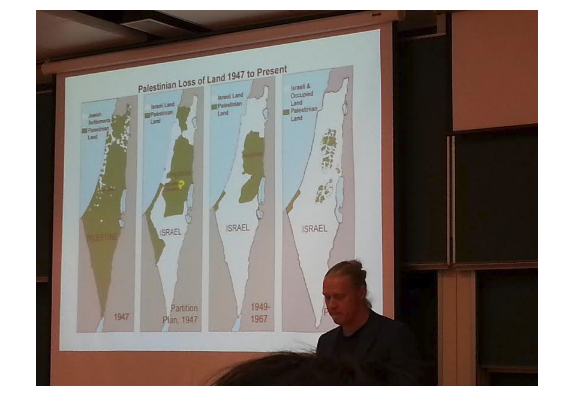
Photo from The Tundra Tabloids, February 2014: http://tundratabloids.com/2014/02/eappi-in-finland-demonizing-jews-of-judea-samaria-and-hebron/
In Finland in 2014, EAPPI and Finn Church Aid traveled to major university campuses alleging that Israel victimizes and discriminates against the Palestinian population and “vindictively persecutes” Palestinian children. ICHAD Finn also promoted the tour.
In Germany EAPPI is “administered by a coordination circle that includes the Association of Protestant Churches and Missions in Germany (EMW), Bread for the World – Protestant Development Service and the following three sending organizations: pax christi Germany [sic], Berlin Mission (BMW) and Evangelical Mission in Solidarity (EMS). EAPPI Netzwerk, the network of EAPPI program participant alumni is responsible for EAPPI’s lobby and advocacy work and is signatory to a 2014 “call for the suspension of the EU-Israel Association Agreement.”
In Sweden, EAPPI is organized, in part, by the Swedish Council of Churches along with a steering committee. The steering committee includes “representatives from Diakonia and Sabeel Scandinavia… [and] the Swedish part of the program is funded by Sida funds.” Sabeel supports a “one state solution,” meaning the elimination of Israel as a Jewish state, and applies “liberation theology,” claiming that Palestinians represent a modern-day version of Jesus’ suffering. This includes deicide imagery and supercessionist rhetoric used to demonize Israel and Judaism.
In the US, EAs are selected to participate in EAPPI through EAPPI-US. In partnership with Church World Service, EAPPI-US is supported by US national churches including Christian Church (Disciples of Christ), Episcopal Church, Evangelical Lutheran Church in America, Presbyterian Church, United Church of Christ, and United Methodist Church. Additionally, Global Ministries is one of the National Coordinators of EAPPI in the US and donations to EAPPI-US are provided via Global Ministries.
On May 18, 2018, the co-executive of Global Ministries, Rev. James Moos, published a letter “The ongoing Nakba” stating that “May 15 is known to Palestinians as Nakba (‘catastrophe’) Day; it comes the day after Israelis celebrate their Independence Day. This year will mark 70 years since the state of Israel was created and 750,000 Palestinians were displaced and dispossessed, resulting in a Palestinian diaspora and refugee population that now numbers over 5 million” (emphasis added).
On April 12, 2018 Global Ministries published a letter ”Right of Refugees, Right to Demonstrate Peacefully, Right to Dignity” signed by all churches that support EAPPI-US. The letter states that “More than 1.3 million of Gaza’s nearly 2 million people are refugees. The Gaza demonstrations are an assertion of Palestinian rights…Palestinian refugees have the right to return to their homes, and to compensation for loss of property, as laid out in UN General Assembly resolution 194…We call upon the United States…to censure the violent and indiscriminate actions of the State of Israel in response to the demonstrations which in no way threaten the security of the state or its citizens, and to hold Israel appropriately accountable, ensuring that US aid isn’t used in ways that contravene established US and international laws, given the more than $3 billion in military aid the US disburses to Israel annually” (emphasis added). The BDS organizations American Friends Service Committee (AFSC) and Pax Christi also signed.
International Frameworks
Since 2007, EAPPI has participated in the Protection Cluster Working Group (PCWG) and the Settler Violence Core Group (SVCG) – both UN participatory forums are comprised of UN agencies as well as local and international NGOs in the West Bank and Gaza. According to UNOCHA, “It’s the main inter-agency forum in the oPt for the collaboration and overall coordination of activities supporting protection in humanitarian action. Members of the PCWG meet periodically – once a month – to discuss issues of concern.” EAPPI’s role in these groups is “ongoing submission[s] of incident reports to the SVCG, UN agencies and other relevant actors. Participation in meetings of the Silwan Task Force/East Jerusalem Task force and AIDA, and the Education Cluster.”10 As noted, EAs “monitor for human rights violations and do a lot of administrative work which is fed into UN systems” (emphasis added).
Since 2013, EAPPI has received funding from UNICEF for a project titled “Protected and safe access to schools as an emergency response for vulnerable communities in the oPt.” In addition, EAPPI was an implementing partner on a 2015 UNICEF grant “to support all aspects of documentation and reporting, information sharing, and data collection.”
Under the UNICEF Working Group framework (see NGO Monitor’s report “UNICEF and its NGO Working Group”) EAPPI is responsible for monitoring and reporting on alleged instances of violations related to education. However, as detailed in NGO Monitor’s report, EAPPI volunteers lack the requisite research skills and experience to be able to fulfill this capacity.
A ”Protection Cluster – Summary response Plan” elaborates on how information gathered by EAPPI is utilized throughout the UN system, including in the high level UN reporting by the Secretary-General. The document explains that EAPPI will be active in providing “Ongoing submission of incident reports to the SVCG, UN agencies and other relevant actors” and a July 2013 UNICEF situation report adds that EAPPI provides “monthly Check Point Monitoring Logs to the international community.” According to the same report, UNICEF has partnered with EAPPI since May 2013 and by the time of writing the report had already provided “safer and timelier access to schools” to 3,317 children (1,037 girls and 2,280 boys) and 249 teachers.
Additionally, EAPPI coordinates its work with “other protective presence organizations such as UNWRA, UNOCHA, OHCHR, UNICEF in all placements, TIPH (Hebron), CPT (Hebron, South Hebron Hills), ISM (Northern West Bank, Hebron and South Hebron Hills) and Operation Dove (South Hebron Hills).”11
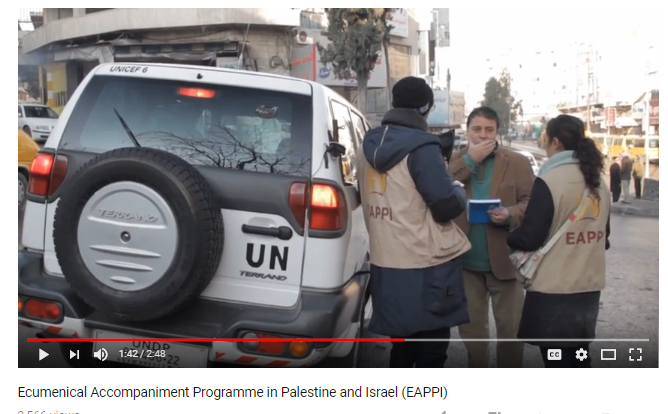
EAPPI activists reports to UN official Screenshot from World Council of Churches Youtube video, May 9, 2014: https://www.youtube.com/watch?v=3b6x3_8lg9E&t=14s
Coordinators
The Jerusalem Inter Church Centre (JIC): Headed by Yusef Daher, JIC hosts the EAPPI Jerusalem Office and provides “guidance and coordination with the local churches.” Daher is one of the editors of “Faith under Occupation” (mentioned above) and is co-author of the Kairos Palestine document. In 2015, Daher spoke at a BDS event “ISRAEL: A Palestinian Christian Perspective.” In 2010, he spoke at a conference in Stockholm, where he stated, “We supported BDS we believed in the result that BDS can make and actually we… said that a full system of sanctions should have implemented on Israel long time ago…this is where we call our brothers and sisters to go for boycott. First personally and individually, and then convincing the churches and the churches to convince their governments…”
Palestine Israel Ecumenical Forum (PIEF): Palestine Israel Ecumenical Forum (PIEF) is a WCC program launched in 2007 to “catalyze and co-ordinate new and existing church advocacy for peace, aimed at ending the illegal occupation (of Palestinian territories) in accordance with UN resolutions, and demonstrate its commitment to inter-religious action for peace and to justice that serves all peoples of the region.” According to EAPPI, PIEF is one of its “partner structures and key partners.”
Like WCC and EAPPI, PIEF and its leaders also have made highly politicized statements regarding Israel and the conflict. PIEF annually organizes “World Week for Peace in Palestine Israel” (WWPPI). In 2014, the theme of WWPPI was “Let my people go,” referring to “Palestinian political prisoners” – a term that includes terrorists convicted for attacks against civilians. PIEF cites Addameer, an “affiliate” of the Popular Front for the Liberation of Palestine (PFLP) terrorist organization, in defining a political prisoner as, “someone arrested on the basis of his or her opposition to the occupation of Palestine.”
Robert O. Smith is co-moderator of PIEF and participated in the 10th International 2017 Sabeel Conference with Jeff Halper, Omar Barghouti, and other prominent BDS activists. The conference included a “Checkpoint experience visit with EAPPI.” Additionally, a 2014 Nakba Day message from the co-moderators of PIEF, Robert Smith and Muna Mushahwar, stated that “The ‘Nakba’ continues today…the State of Israel continues its rapacious acquisition of Palestinian land and its systematic suppression and abuse of the Palestinian people…The only thing that will change Israel’s policies and behavior is international pressure…”
Other Partners
W’iam: a Palestinian NGO that promotes BDS campaigns against Israel, utilizes “apartheid” rhetoric, and seeks to demonize Israel through Christian theology. Dr. Zoughbi Zoughbi, W’iam’s founder and director, has been EAPPI’s Secretary and the Local Programme Coordinator since June 2017. In August 2014, Zoughbi said, referring the 2014 Gaza war, “They started in the West Bank with the story of the 3 disappearing children and until this morning we are not sure what happened with them” (emphasis added). In contrast to Zhoughbi’s retelling, Gilad Shaar, Naftali Fraenkel, and Eyal Yifrach were kidnapped and murdered on June 12, 2014. Their bodies were found on June 18, 2014.
National Coalition of Christian Organizations in Palestine (NCCOP): As its name states, NCCOP is a coalition of Christian and Church-related organizations in the West Bank, Gaza, and East Jerusalem. NCCOP organized a ceremonial launching of WCC and PIEF’s “World Week for Peace in Palestine Israel.” The ceremony took place at Wi’am Palestinian Conflict Resolution and Transformation Center and included an introduction to a book on prisoners published by the WCC in cooperation with Addameer and Defense for Children International – Palestine (DCI-P) –Palestinian NGOs with alleged ties to the PFLP.
On June 12, 2017, NCCOP issued an open letter to the WCC, in which they asked WCC to, “recognize Israel as an apartheid state; unequivocally condemn the Balfour declaration as unjust, and…speak in support of economic measures that pressure Israel to stop the occupation and go further to support sport, cultural and academic measures against Israel … urging the ending of its occupation, Apartheid and discriminations, and accepts refugees to return to their home land and properties. In response to Israel’s war on BDS, we ask that you intensify that measure” (emphasis added).
In response, “The WCC leadership will bring the letter to the next meeting of its Executive Committee in November 2017 in Amman, Jordan. The WCC also invited its member’s churches and partners worldwide to read and share the letter as a local voice from today’s Palestine.”
Christian Peacemaker Teams (CPT): Similar to EAPPI, CPT sends volunteers to conflict zones, including to the West Bank. These volunteers have little to no contact with Israeli society and return to their home churches to advocate for BDS. EAPPI and CPT meet “every two weeks in Hebron to share information and coordinate patrols of the city and other activities.” In 2010, CPT-Palestine “decided to endorse formally the Boycott, Divestment and Sanctions (BDS) movement, as called for by Palestinian NGOs…” In 2015, CPT and EAPPI were implementing partners on a Canadian funded UNICEF project “Emergency Assistance – Education in Emergencies and Child Protection.”
Machsom Watch: Frequently interferes and provokes IDF soldiers. A YouTube video shows activists harassing a soldier at a checkpoint, haranguing him for engaging in “apartheid.” Members of Machsom Watch meet “with EAPPI volunteers and share information.”
The East Jerusalem YMCA (JAI): promotes BDS and uses rhetoric that includes accusations of “apartheid,” “collective punishment,” and “war crimes.” JAI “meets with some EAPPI teams upon arrival to Palestine, invites teams to attend many of the JAI activities and programs, coordinates for visiting groups and delegation to the JAI for meeting with some EAPPI teams on various spots and locations.”
Association of International Development Agencies (AIDA): active since 1967, AIDA “is a membership body and coordination forum of over 80 international non-governmental and non-profit organizations working in the occupied Palestinian territory.” EAPPI is a member of AIDA, together with several of its National Coordinators including DanChurchAid, HEKS EPER, and Norwegian Church Aid (NCA).
Breaking the Silence: active in promoting “war crimes” charges against Israel that are based on anonymous and unverifiable hearsay “testimonies.” As stated by EAPPI, “Since a lot of EAPPI’s work involves observing and monitoring the treatment of people at checkpoints manned by Israeli soldiers it is natural for those in the programme to work with Breaking the Silence.”
B’Tselem: a politicized Israeli NGO that “acts primarily to charge Israeli policy in the Occupied Territories…” EAPPI “helped B’Tselem provide information and photographs on activities such the uprooting of Palestinians’ olive trees during Israeli settler expansion.”
Rabbis for Human Rights: according to an NCA report, “EAPPI and RHR contribute to protect vulnerable populations, many of them Bedouin villages… Through its networks NCA, EAPPI and RHR have also advocated directly to ministers and government officials as well as through news and social media, resulting in political pressure on Israel from both within and internationally.”
Conclusion
This report is the first comprehensive study of EAPPI’s organizational structure, funding, and goals. The examples discussed above represent only a fraction of the activities in which EAPPI participants partake in Israel and the West Bank and internationally.
The positions and statements of WCC officials are entirely incompatible with the organization’s stated desire to improve relations with the State of Israel. NGO Monitor’s research shows that the WCC, the National Coordinators, and EAPPI all play critical roles in delegitimization campaigns against the Israel, including by coordinating these efforts with other organizations in the West Bank. From antisemitic comments from WCC officials through EAPPI’s training programs and international activity, it is clear that EAPPI is a political program unrelated to improving or safeguarding human rights.
It is important to note that during the preparation of this report, NGO Monitor researchers corresponded with WCC officials in order to receive answers to questions that arose during the research process. These stemmed from discrepancies between stated goals and activity as well as from a lack of transparency regarding funding. The WCC responses were largely unhelpful in clarifying these issues.
Footnotes
- See definitions of antisemitism from International Holocaust Remembrance Alliance (IHRA) and in a June 1, 2017 European Parliament resolution.
- Jeff Halper, co-founder and former director of the Israeli NGO ICAHD, claims to have been one of the founders of EAPPI in Geneva. In 2015, ICAHD was closed due to a court order. The Israeli Registrar of Non-Profits filed an order to dismantle the organization following ICAHD’s failure to report donations from foreign political entities, failure to file annual reports, lack of response to requests made by the Registrar, illegal use of the name of the organization, and the lack of reporting names of board members.
- Document on file with NGO Monitor. EAPPI, “Role description for, and qualities sought in Ecumenical Accompaniers.”
- The Kairos Palestine document calls for BDS against Israel, denies the Jewish historic connection to Israel in theological terms, and blames Israel alone for the continuation of the conflict. The Kairos document also includes justification of terrorism against Israeli citizens, calling it “legal resistance”: “Some (Palestinian) political parties followed the way of armed resistance. Israel used this as a pretext to accuse the Palestinians of being terrorists and was able to distort the real nature of the conflict, presenting it as an Israeli war against terror, rather than an Israeli occupation faced by Palestinian legal resistance aiming at ending it” (emphasis added). It additionally states that the “roots of ‘terrorism’ are in the human injustice committed and in the evil of the occupation.” The co-author of the Kairos Palestine document, Rifat Odeh Kassis, was EAPPI’s international coordinator and project manager from 2005-2007.
- For example, its central committee meeting in Trondheim, Norway, which took place on June 22-28, 2016, called on “WCC member churches, specialized ministries and ecumenical partners…to recognize Christian Zionism as a form of Christian fundamentalism endangering especially indigenous Palestinian Christian communities.”
- Rev. Dr. Owe Boersma, based in Geneva, has been the international coordinator of WCC-EAPPI since September 2016. The position was previously held by Manuel Quintero, who served in the role for eight years.
- If an applicant does not have a national coordination in his/her country they are asked to contact the “Area Representative Middle East Norwegian Church Aid c/o Jerusalem Inter Church centre.”
- 76% of its funding is provided by the Norwegian Ministry of Foreign Affairs.
- See also a presentation created by JIC, a presentation created by EAPPI-US, and a presentation created by the WCC.
- OPT-16/P-HR-RL/88451
- OPT-14/P-HR-RL/61102
